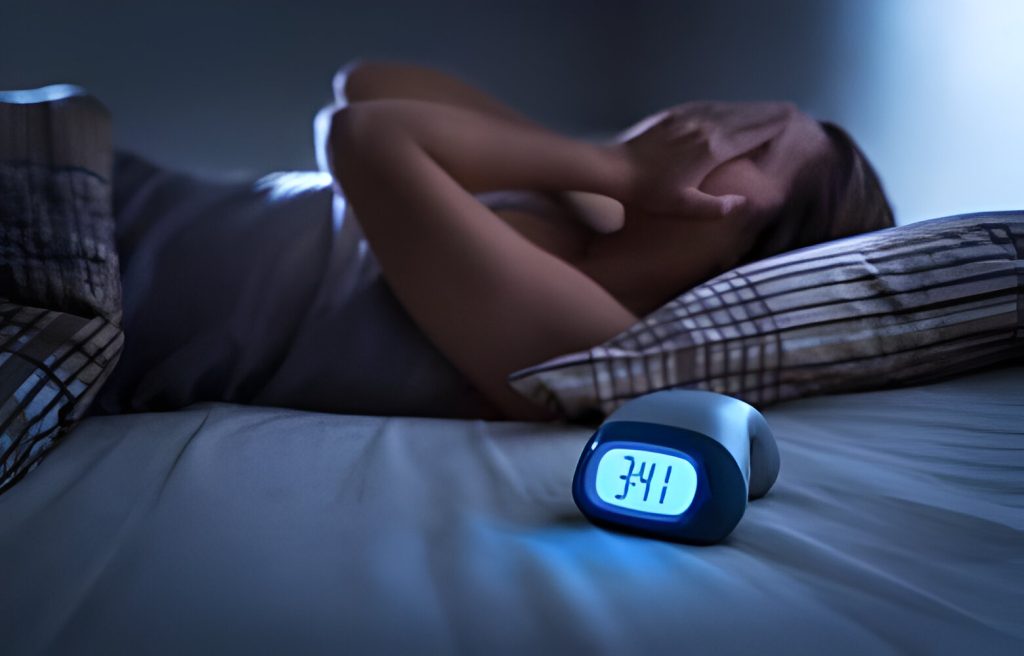- KNOWLEDGE BASE
- EATING DISORDERS
- General Topics
- No posts found for the specified taxonomy and term.
- General Topics
- EATING DISORDERS

SWISS MEDICAL EXPERTISE: ZURICH, MALLORCA, LONDON, MARBELLA


CONDITIONS WE TREAT
PROGRAMS
Intensive residential treatment program starting from 4 weeks. Location: Mallorca, Zurich, London.
Comprehensive second opinion assessments for both psychiatric and general health concerns. Location: Mallorca, Zurich, London
ADDITIONAL INFORMATION





10 Minutes
CONTENTS
Anxiety and sleep disorders affect millions of people across the world, both individually and simultaneously. The two disorders share an intricate, multifaced relationship affecting each other in complex ways. Anxiety disorders are characterized by excessive worry and fear and are known to be one of the most common mental health issues globally. Sleep, on the other hand, is a fundamental biological process, critical for sound psychological and physical health. The co-occurrence of these disorders often brings on serious consequences, requiring a well-integrated community-based therapeutic approach for well-rounded treatment.
Following are some key ways in which anxiety can impact sleep:
Insomnia is one of the most common issues triggered by anxiety. It often presents in two ways: [1]
Anxiety can make an individual have racing thoughts and heightened arousal that makes it difficult to relax and fall asleep. Moreover, frequent awakenings during the night can cause sleep fragmentation and reduce its role in rejuvenation and recovery.
Many people with underlying anxiety and posttraumatic stress disorder (PTSD) have nightmares. [2] These distressing nightmares can cause nighttime awakenings and difficulty falling back to sleep. While nightmares are an indication that the brain is processing traumatic experiences, they can easily exacerbate anxiety and lead to poorer sleep quality.
Anxiety can often push a person into a hyperarousal state, characterized by an elevated heart rate, muscle tension, and increased alertness. This state of hyperarousal can disturb sleep by not allowing the body to be in a restful state. When this continues for a long time, such as in chronic anxiety, many individuals encounter long-term sleep disturbances.
Anxiety and sleep disorders share a bidirectional relationship. What this means is while anxiety is known to cause sleep problems, sleep disorders can also exacerbate underlying anxiety.
The following sections briefly explain this bidirectional relationship, explaining how one condition may lead to another.
Anxiety is characterized by excessive fear, worry, and racing thoughts. These persistent symptoms can make it difficult to relax, unwind, and allow the body to fall asleep. Following are some sleep disorders that anxiety can predispose a person to:
Sleep deprivation is also known to worsen the symptoms of anxiety. A lack of sleep can negatively affect the brain’s ability to regulate emotions, causing mood swings, increased irritability, and increased sensitivity to stress. Moreover, it also interferes with cognitive functions, making it more challenging to get through anxiety-triggering situations. When the sleep deprivation issue continues, it worsens anxiety disorder.
Experts now believe that multiple neurobiological mechanisms are also behind the association shared by anxiety and sleep disorders. Some key neurobiological mechanisms include the following:
The amygdala is a certain area of the brain involved in processing emotions and is known to play a key role in managing anxiety and sleep regulation. People with anxiety often have an overactive amygdala which heightens their stress responses and fear. This overactivity can interrupt sleep patterns by pushing a person into a state of hyperarousal and hindering them from falling or maintaining sleep. Neuroimaging techniques have also proven that sleep deprivation makes the amygdala more active, leading to a vicious cycle where both conditions keep worsening each other. [4]
Also known as HPA, the hypothalamic-pituitary-adrenal axis forms a key component of the stress response system. This system often gets dysregulated in a person with anxiety, leading to excessive production and secretion of the stress hormone cortisol. This elevated cortisol level interferes with the normal sleep-wake cycle and decreases the time a person spends in deep sleep stages. Additionally, ongoing stress due to anxiety can chronically activate the HPA axis, triggering long-term changes in the sleep architecture. Moreover, this long-term activation can also cause chronic insomnia. [5]
The role of behavioral and psychological factors in anxiety and sleep disorders is briefly explained below:
Certain lifestyle and behavioral factors linked with anxiety can lead to sleep issues. For instance, people with anxiety often adopt an avoidant behavior where they isolate themselves and use alcohol to cope with anxiety. These behaviors negatively affect the sleep-wake cycle, causing sleep problems.
These factors play a key role in the relationship between sleep and anxiety. Individuals with underlying anxiety often engage in rumination and worry that negatively affect their ability to relax their minds and fall asleep. Certain cognitive thinking patterns, such as catastrophic thinking where an individual anticipates the worst possible outcomes in every situation, can also cause sleep difficulties. [6]
Therapeutic communities describe structured environments providing a communal lifestyle to people seeking active treatment for anxiety and sleep issues. These communities typically operate on the following principles:
Following the principles mentioned above, therapeutic community-based treatment is the best program to manage anxiety and sleeplessness
Therapeutic community-based treatment can be extremely effective in helping people learn how to sleep better with anxiety. Both disorders often involve a complex interplay of social, physiological, and psychological factors, and seeking community interventions through a recognized program can address all these dimensions.
Our specialized centers provide therapeutic interventions in a community-based setting using integrated support, focusing on several elements, such as lifestyle modifications, therapy, and social support.
Group therapy remains a cornerstone of treatment for anxiety and sleep disorders, particularly in a therapeutic community. This therapy provides patients with a platform to learn from others, share experiences, and receive support. For anxiety and sleep issues in particular, group therapy can help a person:
Cognitive behavioral therapy is a well-known treatment for sleep disorders and anxiety. It is available in both one-to-one and group settings and often includes the following key components: [7]
Mindfulness-based strategies, such as mindful cognitive therapy and mindfulness-based stress reduction can reduce anxiety and improve sleep. Some of these techniques are briefly explained below:
Lifestyle interventions play a major role in the management of sleep anxiety symptoms. Some elements to focus on as a part of this plan include the following:
Social support is one of the best ways to help people who can’t sleep due to anxiety. Therapeutic communities help struggling individuals feel valued and connected which positively impacts their mental health. In the context of anxiety disorders and sleep issues, receiving social help can:
Anxiety and sleep share a complex, bidirectional relationship, each significantly impacting the other. Anxiety can commonly lead to sleep problems through various mechanisms, including neurobiological changes, behavioral factors, and hyperarousal. Conversely, sleep issues have also proven to worsen anxiety through impairment of cognitive function and emotional dysregulation. Fortunately, managing sleep anxiety is possible but requires a comprehensive approach that focuses on the resolution of both physiological and psychological aspects of both issues.
Therapeutic community-based treatments are often the treatment of choice as they offer a supportive and holistic approach to sleep anxiety management. By integrating social support, therapy, and lifestyle modifications in a communal setting, this treatment approach can successfully address the multifaceted nature of anxiety and sleep issues. Our exclusive therapeutic community-based treatment program incorporates the principles of democratic participation, holistic care, and mutual self-help to create an environment conducive to personal growth and healing. Contact us now to be a part of the change.
[1] Kaur H, Spurling BC, Bollu PC. Chronic insomnia.
Anxiety can negatively impact sleep in different ways. For instance, it causes sleep-onset insomnia, making it hard to fall asleep due to heightened arousal and racing thoughts. Anxiety also triggers sleep maintenance insomnia where people struggle to stay asleep with frequent night awakenings. These awakenings impair the rest and recovery period and make it difficult for them to go about with daily functions without feeling sleepy. Some people, especially those with previous PTSD, can also experience frequent nightmares due to constant anxiety, making sleep impossible.
A lack of sleep can significantly worsen anxiety by interrupting normal emotional regulation. Sleep deprivation also triggers mood swings and irritability while making a person more sensitive to stress. If chronic, sleep deprivation causes long-term changes in the brain, worsening the anxiety disorder.
Therapeutic community-based treatment often involves delivering care in structured environments where people seek mutual support in communal living. Such a setting provides a platform to share experiences and learn healthy coping strategies. Community treatment often incorporates evidence-based therapies, such as cognitive behavioral therapy to address negative behaviors and thought patterns associated with anxiety while helping people learn relaxation techniques and lifestyle modifications to keep their symptoms under control.
Lifestyle changes like exercise and a good diet can improve sleep quality and reduce anxiety. Good sleep hygiene, including establishing a sleep schedule, reducing exposure to caffeine and alcohol, and forming a conducive sleep environment, is also imperative for better management of anxiety and sleep issues. Lastly, stress reduction therapies, like spending more time on hobbies and getting support from loved ones, can also make a difference.
COGNIFUL is a leading provider of luxury addiction and mental health treatment for affluent individuals and their families, offering a blend of innovative science and holistic methods with unparalleled individualised care.
We believe in the healing power of a community that brings together collective wisdom and individual insight from collective group sessions and activities. We offer a variety of activities and therapies, from group workshops to communal living experiences, every aspect of our program is designed to foster growth, understanding, and self-improvement.
more infoOur program is uniquely designed to meet your needs, with our team closely monitoring your progress. Our therapists are committed to addressing the underlying causes of your challenges, not just the surface symptoms. This deep, root-level therapy extends beyond your stay with us, ensuring enduring success and well-being.
more infoOur team of specialists integrates the most effective strategies from psychological care and holistic medicine, offering you personalized support. This approach includes a range of complementary therapies, all seamlessly coordinated to work together in a comprehensive, integrative manner for your benefit.
more infoThroughout your stay, our dedicated team will ensure a personalized and nurturing experience, providing continuous support and attention. We are committed to guiding you through every step of this transformative journey.
more infoNestled in a serene location close to the calming embrace of the beach, our luxury residence is designed with healing in mind, featuring private suites that offer an oasis of tranquility. Each suite is crafted to provide a personal sanctuary where individuals can reflect, rejuvenate, and recover in peace.
more infoComplex trauma frequently underlies both mental and physical distress. We offer a secure environment, incorporating integrated trauma treatment techniques to facilitate the healing process.
more info